-
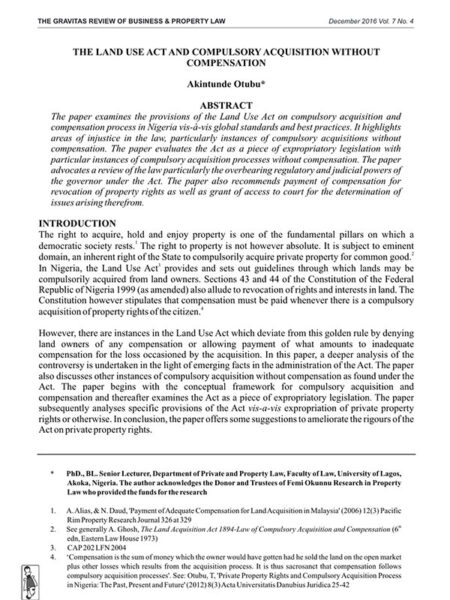
The Land Use Act and Compulsory Acquisition Without Compensation
0₦2,500.00Dr Akintunde Otubu, Senior Lecturer, Department of Private and Property Law, University of Lagos in his article “The Land Use Act and Compulsory Acquisition Without Compensation” examines the provision of the Land Use Act on compulsory acquisition and compensation. Weighing in on the controversy between the ‘nationalisation’ and ‘private property right’ schools, he contends that while the Act nationalises all land in favour of the State, it allows private ownership of the improvements on the land. He explores the half-hectare rule and four instances of revocations by which land is compulsorily acquired without compensation under the Act.
-
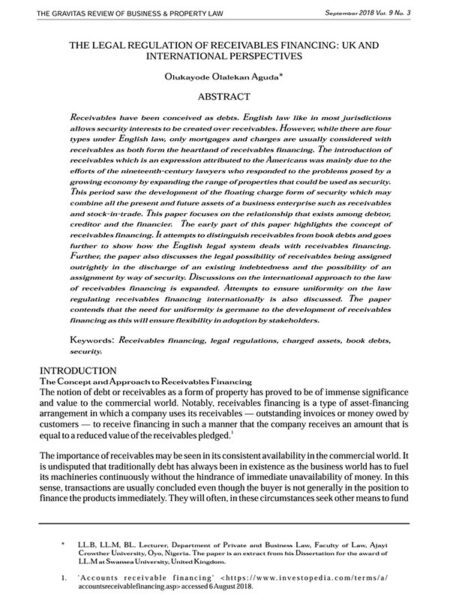
The Legal Regulation of Receivables Financing: The UK and International Perspectives
0₦2,500.00Olukayode Aguda, Lecturer, Department of Private and Business Law, Ajayi Crowther University, Oyo in his article, The Legal Regulation of Receivables Financing: the UK and International Perspectives, notes that receivables are a businessman’s most liquid assets. He highlights the concept of receivables financing, distinguishes receivables from book debts and goes further to show how the English legal system deals with receivables financing. He discusses the legal possibility of receivables being assigned outrightly in the discharge of existing indebtedness and the possibility of an assignment by way of security. He explains the laws of different jurisdictions relating to receivables financing, and international attempts at ensuring uniformity of the law
-
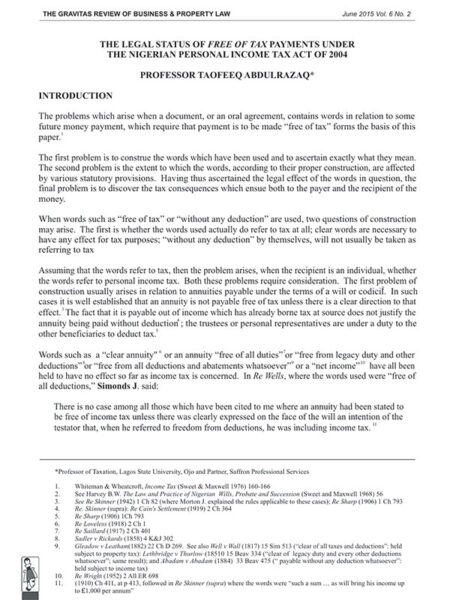
The Legal Status of Free of Tax Payments under the Nigerian Personal Income Tax Act of 2004
0₦2,500.00Dr. Taofeeq Abdulrazaq, FIRS Professor of Taxation, Lagos State University and Partner Saffron Professional Services, examines the legal status of the expressions “free of tax”, “free of all deductions” etc in “The Legal Status of Free of Tax Payments under the Nigerian Personal Income Tax Act of 2004”.
-
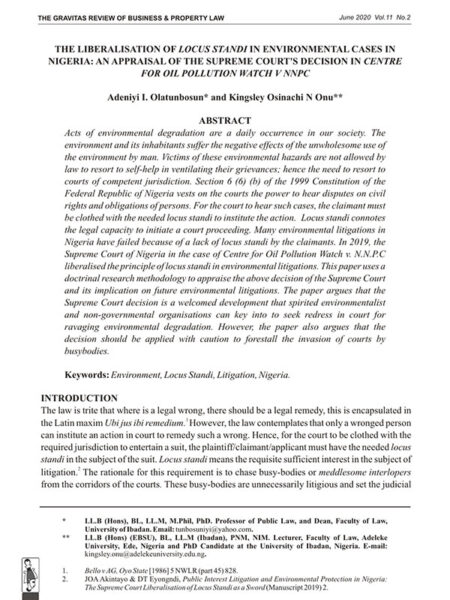
The Liberalisation of Locus Standi in Environmental Cases in Nigeria: An Appraisal of the Supreme Court’s Decision in Centre for Oil Pollution Watch v NNPC
0₦2,500.00Adeniyi Olatunbosun, Professor of Public Law, and Dean Faculty of Law, University of Ibadan, Nigeria and Kingsley Onu, Lecturer Adeleke University Ede Nigeria in their article, The Liberalisation of Locus Standi in Environmental Cases in Nigeria: An Appraisal of the Supreme Court’s Decision in Centre for Oil Pollution Watch v NNPC, comprehensively examine the concept of locus standi in environmental cases. They review the decision of the Supreme Court in COPW V NNPC regarding the locus standi of a non-governmental organisation to sue for an act of environmental degradation. They conclude with an analysis of the effect of the Supreme Court’s decision on future of environmental litigations in Nigeria.
-
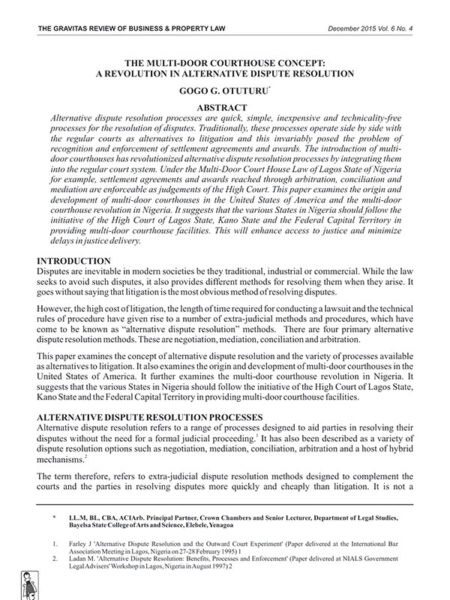
The Multi-door Courthouse Concept: A Revolution in Alternative Dispute Resolution
0₦2,500.00Gogo Otuturu, Principal Partner, Crown Chambers and Senior Lecturer, Department of Legal Studies, Bayelsa State College of Arts and Science, Elebele, Yenagoa in “The Multi-Door Courthouse Concept: A Revolution In Alternative Dispute Resolution” examines the various forms of alternative dispute resolution, the challenge of enforcement of ADR awards and the attraction of the Multi-Door Courthouse concept.
-
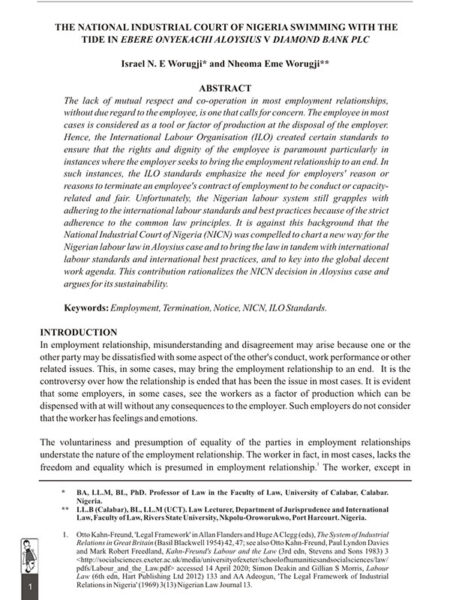
The National Industrial Court of Nigeria Swimming with the Tide in Ebere Onyekachi Aloysius V Diamond Bank Plc
0₦2,500.00Professor Israeli Worugji of the University of Calabar, Nigeria and Nheoma Worugji of the Rivers State University, Nkpolu-Oroworukwo Port Harcourt Nigeria, in their article, The National Industrial Court of Nigeria Swimming with the Tide in Ebere Onyekachi Aloysius V. Diamond Bank, note that ordinarily, an employer has the freedom to terminate the employment of an employee upon due notice and regardless of motive. The National Industrial Court of Nigeria (NICN) in a recent decision, however, seems to have limited the employer’s otherwise open-ended power to bring the contract of employment to an end. In Aloysius case, the NICN, relying on international labour standards and its new mandate under the Constitution (Third Alteration) Act, decided that no termination of a contract of employment should take place unless there is a valid reason connected with the capacity or conduct of the employee or based on the operational requirements of the establishment.Professor Israel Worugji and Nheoma Worugji review the Aloysius the case against the background of the common law and statutory provision on termination of employment, the International Labour Organisation’s instruments and international best practices.
-
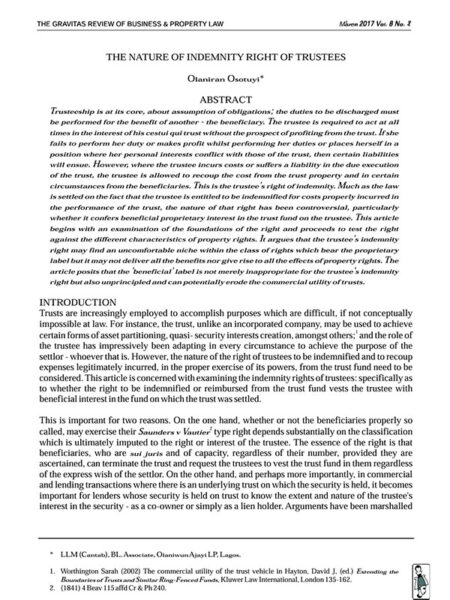
The Nature of Indemnity Right of Trustees
0₦2,500.00Olaniran Osotuyi, Associate, Olaniwun Ajayi LP examines “The Nature of Indemnity Right of Trustees”. While the law is fairly settled on the right of a trustee to be indemnified, to recoup the cost from the trust property and in certain circumstances from the beneficiaries for costs properly incurred in the performance of the trust, the nature of that right has been controversial, particularly whether it confers beneficial proprietary interest in the trust fund on the trustee. The article examines the foundations of the trustee’s right of indemnity and argues that while the trustee’s right may find an uncomfortable niche within the class of rights which bear the proprietary label, it may not deliver all the benefits nor give rise to all the effects of property rights
-
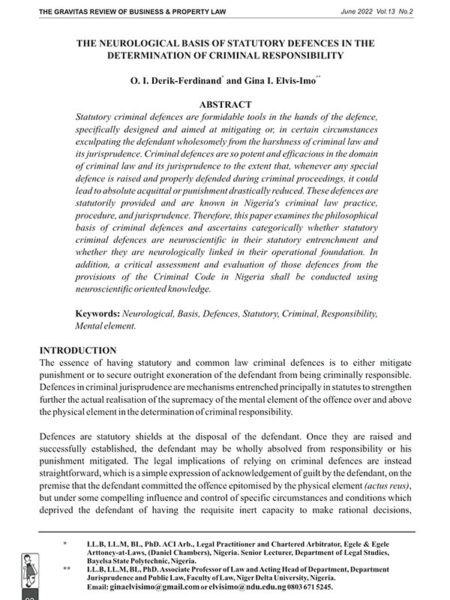
The Neurological Basis of Statutory Defences in the Determination of Criminal Responsibility
0₦2,500.00Dr O. I. Derik-Ferdinand, Senior Lecturer, Department of Legal Studies, Bayelsa State Polytechnic and Dr Gina Elvis-Imo, Acting Head of Department, Department of Jurisprudence and Public Law Niger Delta University, in their paper, The Neurological Basis of Statutory Defences in the Determination of Criminal Responsibility, explain that statutory criminal defences are formidable tools in the hands of the defence, specifically designed and aimed at mitigating or, in certain circumstances exculpating the defendant wholesomely from the harshness of criminal law. Derik-Ferdinand and Elvis-Imo examine the philosophical basis of criminal defences and ascertain whether statutory criminal defences are neuroscientific in their statutory entrenchment and whether they are neurologically linked in their operational foundation. In addition, they assess and evaluate the criminal defences from the provisions of the Criminal Code in Nigeria.
-
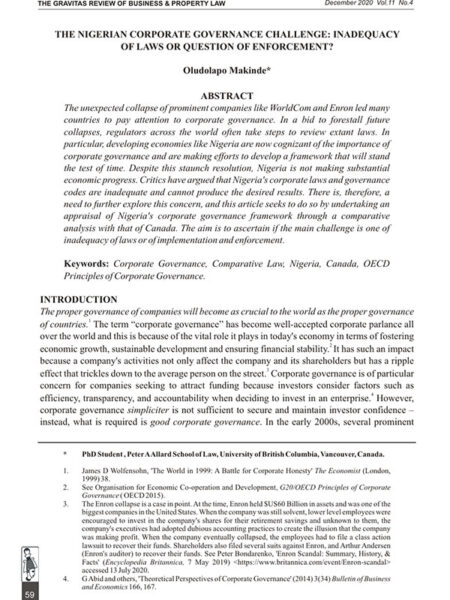
The Nigerian Corporate Governance Challenge: Inadequacy of Laws or Question of Enforcement
0₦2,500.00Oludolapo Makinde, PhD Student at the Peter Allard School of Law, University of British Columbia Vancouver Canada in her article, The Nigerian Corporate Governance Challenge: Inadequacy of Laws or Question of Enforcement, argues that while the need to develop a corporate governance framework that will stand the test of time is beyond question, it is debatable whether the corporate governance architecture in Nigeria is adequate. Makinde undertakes an appraisal of Nigeria’s corporate governance framework through a comparative analysis with that of Canada. The aim is to ascertain if the main challenge is one of the inadequacies of laws or implementation and enforcement.
-
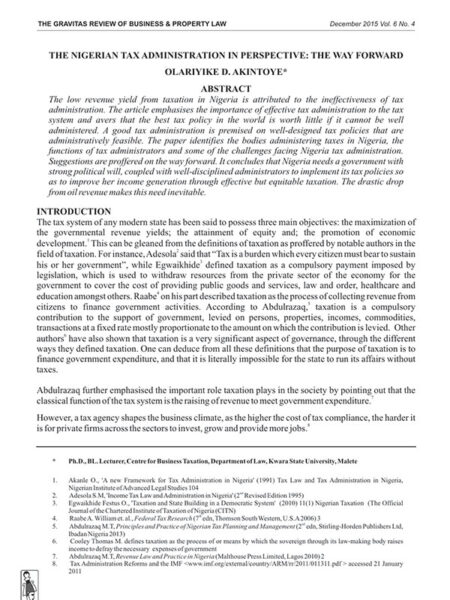
The Nigerian Tax Administration in Perspective: The Way Forward
0₦2,500.00Dr. Olariyike Akintoye of the Centre for Business Taxation, Kwara State University, Malete in “The Nigerian Tax Administration in Perspective: The Way Forward”, examines the legal framework for tax administration in Nigeria analysing the challenges and proffering ways to improve governments’ income generation through effective but equitable taxation.
-
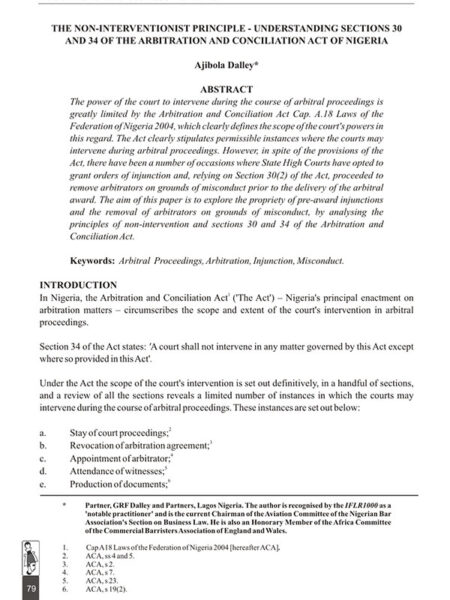
The Non-Interventionist Principle – Understanding Sections 30 and 34 of the Arbitration and Conciliation Act of Nigeria
0₦2,500.00Ajibola Dalley, Partner, GRF Dalley and Partners Lagos Nigeria in his article, The Non-Interventionist Principle – Understanding Sections 30 and 34 of the Arbitration and Conciliation Act of Nigeria, notes that though the power of the court to intervene during the course of an arbitral proceeding is limited by the Arbitration and Conciliation Act, some courts have granted orders of injunction and proceeded to remove arbitrators on grounds of misconduct prior to the delivery of the arbitral award. He explores the propriety of pre-award injunctions and the removal of arbitrators on the grounds of misconduct by analysing sections 30 and 34 of the ACA and other principles of non-intervention replete in the Act.
-
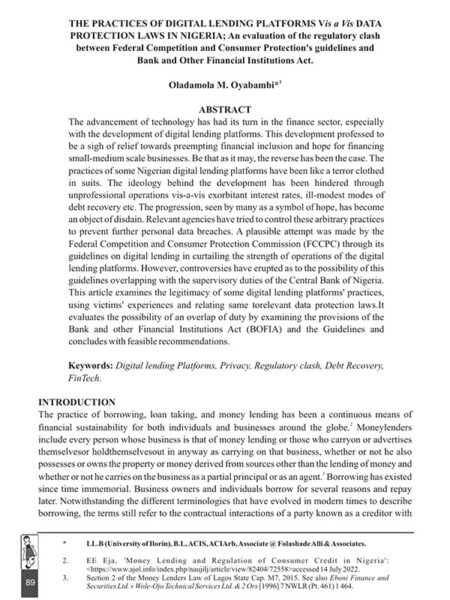
The Practices Of Digital Lending Platforms Vis A Vis Data Protection Laws In Nigeria
0₦2,500.00In his article, Practices Of Digital Lending Platforms Vis A Vis Data Protection Laws In Nigeria, Oladamola Oyabambi examines the legitimacy of the practices of some digital lending platforms, using experiences of victims and relating same with relevant data protection laws, Oyabambi evaluates the possibility of an overlap of duty by examining the provisions of the Bank and other Financial Institutions Act (BOFIA) and the Guidelines and concludes with feasible recommendations.
The Gravitas Review of Business & Property Law



